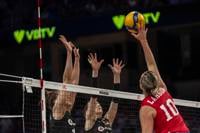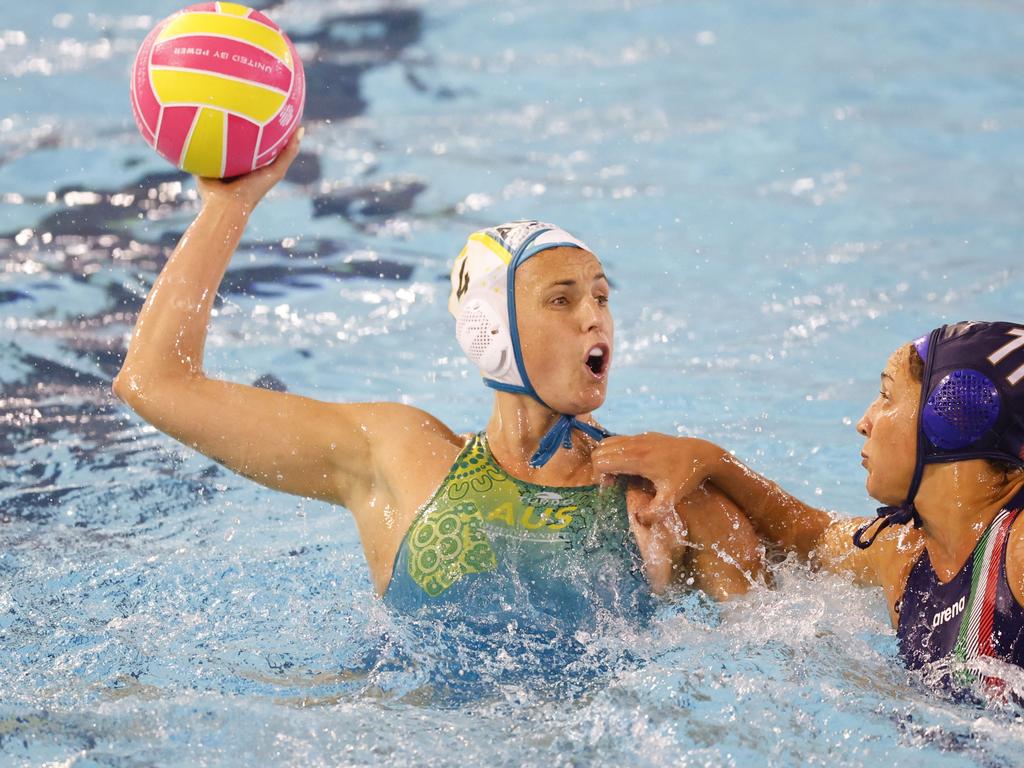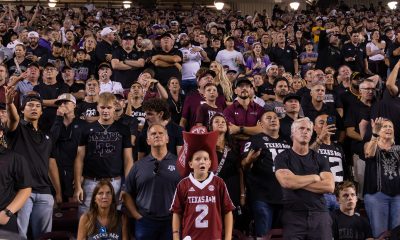
The distribution of revenue-sharing funds to athletes following the recent House v. NCAA settlement raises question about allotment to teams at ASU, whose coaches include from left, Kenny Dillingham (football), Molly Miller (women’s basketball), Missy Farr-Kaye (women’s golf) and Bobby Hurley (men’s basketball). (File photo by Sammy Nute/Cronkite News)
PHOENIX – Arizona State began distributing revenue-sharing funds to athletes Thursday in response to the recent House v. NCAA settlement, a shift in the college sports landscape that raises urgent questions about how colleges will uphold Title IX gender equity laws in the process.
The deal, which allows schools to directly pay athletes for the first time, was approved by Federal Judge Claudia Wilken June 6. It resolved three antitrust lawsuits alleging the NCAA illegally limited athlete compensation.
Under the settlement, the NCAA will pay $2.8 billion in back damages to athletes who competed from 2016-2024 and were fully or partially denied name, image and likeness (NIL) opportunities. Moving forward, each university can also compensate its athletes with the initial annual revenue-sharing cap set for $20.5 million, a mark set to increase yearly.
Arizona State athletic director Graham Rossini did not reveal what percentage of the money will go toward each team, but he emphasized that football, despite its economic importance to the athletic department, will not be the sole beneficiary.
“We’re maxing out revenue share, we are a full participant,” Rossini said. “There are female sports that will be receiving some of those funds. We’ve got 26 sports, the most in the Big 12 and 14 of them are female sports. We’re very committed to females having opportunities in athletics.”
Although ASU would not reveal percentage distribution, others have, and most are expected to reflect the back-payment formula defined in the $2.8 billion settlement: 75% to football players, 15% to men’s basketball, 5% to women’s basketball and 5% to all remaining sports.
North Carolina athletic director Bubba Cunningham said in a statement that four sports will share the $20.5 million allocation, with football and men’s basketball receiving the majority, and baseball and women’s basketball securing a smaller amount. LSU has said football will receive 75%, and men’s basketball 15%, with the remainder going to other sports.
A 2025 Opendorse report suggests 65.6% of the money at Power 4 schools will go to football, 20.3% to men’s basketball and 6.6% to women’s basketball, leaving only 7.5% for every other sport.
Title IX legal challenges
With ASU one of many Power 4 schools expected to continue prioritizing revenue-generating sports, equity concerns are mounting. Eight athletes from multiple schools already filed an appeal arguing that the settlement, specifically the back damages portion, violates Title IX as female athletes would get less money than players at high-earning men’s programs.
Arthur Bryant, a preeminent lawyer who has won more Title IX cases involving athletes than anyone in the country and recently published a critical Sportico analysis of the settlement, has serious doubts about the House settlement’s Title IX viability in the current landscape of college athletics.
“The House settlement creates Title IX violations and is a Title IX violation in a bunch of ways,” Bryant said. “Title IX requires that the money be distributed proportionally to the men and women athletes. So that’s how schools comply with the House settlement going forward and not create a Title IX problem.
“There are schools who said they’re going to do that, but there are other schools who said that they are going to give 90% of the money to the football and men’s basketball players. Those schools are violating Title IX and they’re walking themselves into a lawsuit against any woman who wants to sue.”
Since its 1972 passage, Title IX has impacted college sports, ultimately leading to the current space where NIL is benefiting female college athletes nearly as much as their male counterparts. For instance, women’s basketball superstars Caitlin Clark and Paige Bueckers have earned more from college NIL deals than their rookie WNBA contracts, a reason why many female basketball and volleyball players stay in college rather than turn professional.
Victoria Jackson, a history professor and co-director of the Great Game Lab at ASU, believes this expansion of opportunities is transformative.
“The benefits NIL has afforded female athletes are better than a salary in any league in any sport in the world,” Jackson said
Unlike Bryant, Jackson is not overly concerned that the House settlement will weaken Title IX protections. Instead of fighting against the money flowing into and from football, she encourages advocates for women’s and Olympic sports to focus on expanding their own revenue streams.
“And now that more football money is going to be staying with football athletes, advocates for women’s sports shouldn’t be fighting against that,” Jackson said. “They should be in support of that and also, you know, making a case that schools should be investing in women’s sports and Olympic sports, but pulling from other pots of money. And so what I’ve been working on is trying to identify new revenue streams to support women’s sports and Olympic sports because they do have value.”
Jackson went a step further, mentioning that colleges should separate football from all other sports given how professional the college game has become. If that were to happen, it would reduce Title IX concerns because most of the revenue-sharing money schools get and give to other sports comes from their football programs.
Jackson’s argument gains support when viewed through the latest Equity in Athletics Disclosure Act data from ASU. The university’s football team brought in $40,162,578, according to the EADA’s 2024 report, while its total revenue from all male and female sports except football and basketball came to $40,649,397, according to the EADA.
Title IX’s role in the NIL era reached the national stage earlier this year. On Jan. 16, President Joe Biden’s Office for Civil Rights issued a memo warning that NIL agreements could violate Title IX if not distributed proportionally. After taking office, President Donald Trump’s administration quickly rescinded the guidance, giving colleges more leeway to avoid pursuing gender equity revenue-sharing models.
Future of non-revenue sports
The combination of the settlement’s approval and Trump’s act sparked concern that non-revenue generating Olympic and co-ed sports such as swimming and diving, track and field and gymnastics could be cut or insufficiently funded, increasing the risk of Title IX violations in this new era of college athletics.
At the end of April, Grand Canyon University announced that this past spring would be the last season for its Division I boys volleyball team, with the school set to only offer the sport at club level next year. On June 16, Washington State University revealed that its track and field program is eliminating its field portion (throws and jumps) to mainly focus on distance events.

As Arizona State and other universities prepare to directly pay its athletes, questions around Title IX compliance are heating up. (3D illustration by Osaka Wayne Studios/Getty Images)
Aaron Hernandez, assistant dean and executive director of the Allan “Bud” Selig Sports Law and Business Program at Arizona State University’s Sandra Day O’Connor College of Law, expressed concern that what has happened at other schools could take place at ASU.
However, Rossini said ASU not only plans to keep all 26 of its sports, but is investing more resources into them. For instance, the school is adding 200 new athletic scholarships to comply with roster limits that replace scholarship limits.
“I get that it’s time for these guys to share in the revenue, but the cost of all these other really special people in the community at schools like ASU is something that really worries me,” Hernandez said. “I hope that there’s a future where we keep our Olympic movement and our women’s sports propped up in a good way.”
ASU athlete’s perspective
One of those “really special people,” as Hernandez put it, is Kate Fitzgerald. Fitzgerald has made it her mission to educate and inspire fellow female college athletes in the NIL space. The co-founder of the Student Athlete Venture Studio, an initiative launched to support female athlete entrepreneurs, Fitzgerald spent four years playing beach volleyball at ASU and a fifth year as a graduate assistant coach while pursuing a master’s degree. In her senior year (2023-2024), Fitzgerald was ASU’s top NIL-earning Olympic sport female athlete, profiting from her volleyball lifestyle clothing brand VBAmerica.
Given her experience with Sun Devil athletics and NIL, Fitzgerald has full trust in Rossini to lead ASU in the right direction.
“He’s definitely helping ASU prevent cuts of programs … ASU always says No. 1 in innovation, so they’re being innovative about NIL and that’s ultimately in my opinion, the best way to go about it,” Fitzgerald said. “These are changing times, so instead of fighting and cutting, let’s try new ways to make money and find a new way to adapt to this newfound lifestyle of college athletics.”
As the House settlement era begins, the athletes most affected may be those outside the spotlight – athletes who, like Fitzgerald, must navigate a shifting landscape with both uncertainty and opportunity.
“If you’re not in a revenue generating sport or have a large social media following, that doesn’t mean you can’t leverage NIL,” Fitzgerald said. “You just have to go after it, and think long term – use NIL to find internships, build your career, and bring in some kind of revenue, even if it’s just food coverage…Realistically, NIL will not fall into your lap.”
In an era where millions of dollars are on the table, the future of college sports may indeed depend on creativity as well as compliance to ensure that progress for some doesn’t come at the expense of equity.
Follow Cronkite News: Phoenix Sports on Twitter.


























 + How signing Turner & waiving Dame impacts the Bucks | NBA Today
+ How signing Turner & waiving Dame impacts the Bucks | NBA Today





































